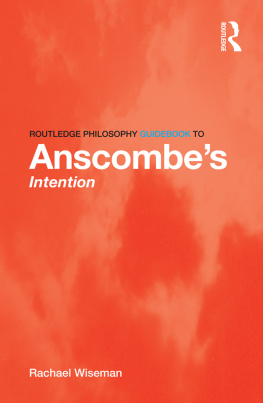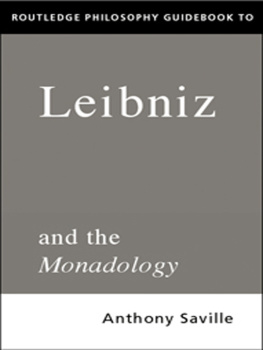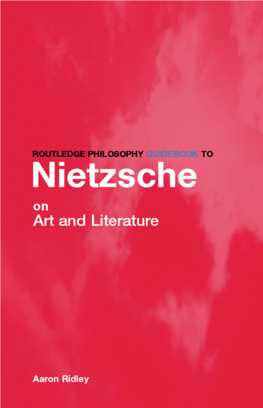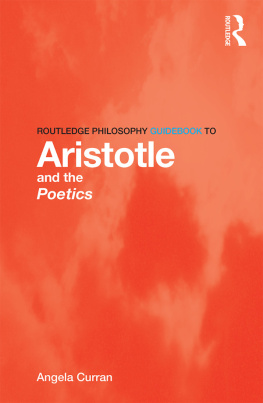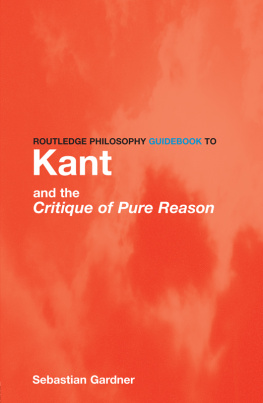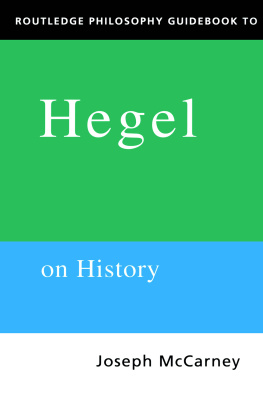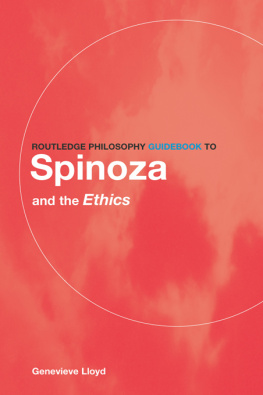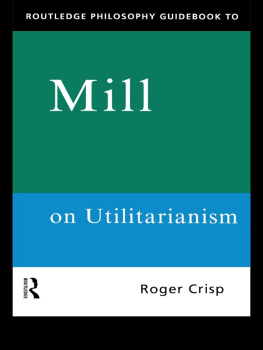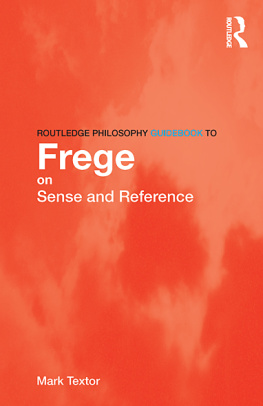Rachael Wiseman - Routledge Philosophy Guidebook to Anscombe’s Intention
Here you can read online Rachael Wiseman - Routledge Philosophy Guidebook to Anscombe’s Intention full text of the book (entire story) in english for free. Download pdf and epub, get meaning, cover and reviews about this ebook. year: 2016, publisher: Routledge, genre: Romance novel. Description of the work, (preface) as well as reviews are available. Best literature library LitArk.com created for fans of good reading and offers a wide selection of genres:
Romance novel
Science fiction
Adventure
Detective
Science
History
Home and family
Prose
Art
Politics
Computer
Non-fiction
Religion
Business
Children
Humor
Choose a favorite category and find really read worthwhile books. Enjoy immersion in the world of imagination, feel the emotions of the characters or learn something new for yourself, make an fascinating discovery.
- Book:Routledge Philosophy Guidebook to Anscombe’s Intention
- Author:
- Publisher:Routledge
- Genre:
- Year:2016
- Rating:5 / 5
- Favourites:Add to favourites
- Your mark:
- 100
- 1
- 2
- 3
- 4
- 5
Routledge Philosophy Guidebook to Anscombe’s Intention: summary, description and annotation
We offer to read an annotation, description, summary or preface (depends on what the author of the book "Routledge Philosophy Guidebook to Anscombe’s Intention" wrote himself). If you haven't found the necessary information about the book — write in the comments, we will try to find it.
Routledge Philosophy Guidebook to Anscombe’s Intention — read online for free the complete book (whole text) full work
Below is the text of the book, divided by pages. System saving the place of the last page read, allows you to conveniently read the book "Routledge Philosophy Guidebook to Anscombe’s Intention" online for free, without having to search again every time where you left off. Put a bookmark, and you can go to the page where you finished reading at any time.
Font size:
Interval:
Bookmark:
First published 2016
by Routledge
2 Park Square, Milton Park, Abingdon, Oxon OX14 4RN
and by Routledge
711 Third Avenue, New York, NY 10017
Routledge is an imprint of the Taylor & Francis Group, an informa business
2016 Rachael Wiseman
The right of Rachael Wiseman to be identified as the author of this work has been asserted by her in accordance with sections 77 and 78 of the Copyright, Designs and Patents Act 1988.
All rights reserved. No part of this book may be reprinted or reproduced or utilised in any form or by any electronic, mechanical, or other means, now known or hereafter invented, including photocopying and recording, or in any information storage or retrieval system, without permission in writing from the publishers.
Trademark notice: Product or corporate names may be trademarks or registered trademarks, and are used only for identification and explanation without intent to infringe.
British Library Cataloguing in Publication Data
A catalogue record for this book is available from the British Library
Library of Congress Cataloging in Publication Data
Wiseman, Rachael.
Routledge philosophy guidebook to Anscombes Intention / Rachael Wiseman.
pages cm.(Routledge philosophy guidebooks)
Includes bibliographical references and index.
1. Anscombe, G. E. M. (Gertrude Elizabeth Margaret). Intention. 2. Intention
(Logic) I. Title.
BC199.I5A539 2016
160dc23
2015035839
ISBN: 978-0-415-82186-5 (hbk)
ISBN: 978-0-415-82187-2 (pbk)
ISBN: 978-1-315-65118-7 (ebk)
Typeset in Garamond
by Book Now Ltd, London

Edited by Tim Crane and Jonathan Wolff
University of Cambridge and University College London
Plato and the Trial of Socrates Thomas C. Brickhouse and Nicholas D. Smith
Aristotle and the Metaphysics Vasilis Politis
Rousseau and the Social Contract Christopher Bertram
Plato and the Republic, second edition Nickolas Pappas
Husserl and the Cartesian Meditations A.D. Smith
Kierkegaard and Fear and Trembling John Lippitt
Descartes and the Meditations Gary Hatfield
Hegel and the Philosophy of Right Dudley Knowles
Hegel and the Phenomenology of Spirit Robert Stern
Berkeley and the Principles of Human Knowledge Robert Fogelin
Aristotle on Ethics Gerard Hughes
Hume on Religion David OConnor
Leibniz and the Monadology Anthony Savile
The Later Heidegger George Pattison
Hegel on History Joseph McCarney
Hume on Morality James Baillie
Hume on Knowledge Harold Noonan
Kant and the Critique of Pure Reason Sebastian Gardner
Mill on Liberty Jonathan Riley
Mill on Utilitarianism Roger Crisp
Spinoza and the Ethics Genevieve Lloyd
Heidegger on Being and Time, second edition Stephen Mulhall
Locke on Government D.A. Lloyd Thomas
Locke on Human Understanding E.J. Lowe
Derrida on Deconstruction Barry Stocker
Kant on Judgement Robert Wicks
Nietzsche on Art Aaron Ridley
Rorty and the Mirror of Nature James Tartaglia
Hobbes and Leviathan Glen Newey
Wittgenstein and the Tractatus Michael Morris
Aristotle and the Politics Jean Roberts
Merleau-Ponty and Phenomenology of Perception Komarine Romdenh-Romluc
Frege on Sense and Reference Mark Textor
Kripke and Naming and Necessity Harold Noonan
Kant on Religion within the Boundaries of Mere Reason Lawrence Pasternack
Wittgenstein and On Certainty Andy Hamilton
Aristotle and the Poetics Angela Curran
Spinoza on Politics Daniel Frank and Jason Waller
Anscombes Intention Rachael Wiseman
Thank you to Addison Wheeler, Durham University, and to the Wheeler family, for the extraodinary fellowship that has enabled me to finish this book. Mr Wheeler recognised that researchers at the start of their intellectual life need nothing more than freedom to pursue ideas, and so created a fellowship that requries only that one make efforts for increased knowledge of people and their make-up so as to enable them to make better use of their life here on earth. It is hard to think of a contemporary philosopher whose work better fits that description than Elizabeth Anscombe. Thank you also to Tom Stoneham and the University of York, who allowed me to spend a term at Chicago University during my teaching fellowship, and to the AHRC for funding the postgraduate work with which my interest in Anscombe began. Thanks too to Adam Johnson at Routledge for balancing perfectly patience and pressure. Detailed comments from two reviewers have, I hope, helped me to improve the manuscript in the final stages.
Many conversations have helped me with this book. I have benefited more than I can say from discussions with members of the Praktisches Denken und Gutes Handeln network, chaired by Mattais Haase, Thomas Hoffman and Tim Henning. Most of what is good in contemporary work on Anscombe has come from members of this network. Adrian Haddock, Jen Hornsby, Mattais Haase and David Hunter have been especially generous with their time and patient with my Wittgensteinianism, and have given me leg-ups when I needed them. At Durham, Andy Hamilton has chivvied me along, discussed Wittgenstein with me at length, and reminded me that philosophy is both fun and serious. Clare MacCumhaill and Luna Dolezal have been wonderful interlocutors and good friends. I began this book at York. Bob Clark was a mentor and friend from the start, and helped me to understand Wittgenstein. Amber Carpenter showed me how to reconnect analytic philosophy and real life; without her guidance and friendship I would certainly not have been awarded my current fellowship, and my philosophical horizons would be much restricted. Marie McGinn is the best philosopher I know and has been the greatest influence on my work. This book would have been better if written under her guidance, but without her help and support in the past, it would have been impossible. The good parts are down to her.
On a personal note, I would like to thank Bill and Yvonne who rescued me from a Craigslist catastrophe in Chicago heres the book I told you I was writing! With the Masters at Gateshead Synchronised Swimming Club Caroline, Cait, Debbie, Ilana, Rachel, Sally, and our intrepid coach Wayne I have learnt all about what it is to lack bodily awareness. My family have put up with being snapped at every time they asked how the book was going; thank you and sorry. Charlotte has kept me company in the library and the pub. Ben, Kadie and little Wynn are wonderful people and I am extremely grateful to have them in my life. Most of all, Joseph, who alone knows how hard it was to write this book. Thanks for waiting.
Expressions of Intention for the Future (23 and 5052)
So far we have limited our discussion to the class of descriptions of what a man is doing under which he knows he is doing it. This class also includes answers to the question Why are you X-ing? which are expressions of intention and give ones further intention in acting. We have not said anything much on the topic of expressions of intention for the future Anscombes first head. As was clear from the last chapter, 4349 have the character of a conclusion, an answer to the question with which Intention began. Between 449 we move from illusory simplicity, to chaotic complexity, to clarity, all without saying much about expressions of intention for the future. It is rather strange, then, to find 449 bookended by discussion of these expressions.
Font size:
Interval:
Bookmark:
Similar books «Routledge Philosophy Guidebook to Anscombe’s Intention»
Look at similar books to Routledge Philosophy Guidebook to Anscombe’s Intention. We have selected literature similar in name and meaning in the hope of providing readers with more options to find new, interesting, not yet read works.
Discussion, reviews of the book Routledge Philosophy Guidebook to Anscombe’s Intention and just readers' own opinions. Leave your comments, write what you think about the work, its meaning or the main characters. Specify what exactly you liked and what you didn't like, and why you think so.

